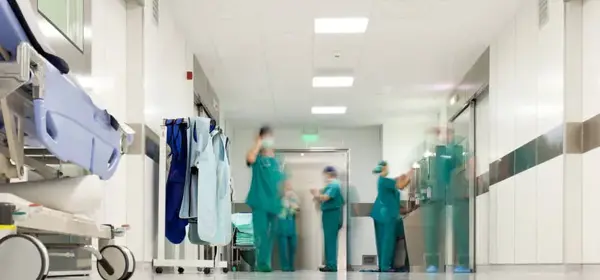Trust leaders point to ‘rock-bottom’ morale of NHS workforce
Trust leaders point to ‘rock-bottom’ morale of NHS workforce
The BMA defends strike action as way to ‘sort out’ pressures
A survey of NHS trust leaders shows the extent of ‘rock-bottom’ morale and burnout across the NHS.
NHS Providers, which polled 172 trust leaders from 106 trusts in England between September and October, also warned that industrial action by resident doctors, planned for later this week, could ‘wipe out NHS recovery’ and ‘crush’ progress.
Its annual State of The Provider Sector survey found that 79 per cent of leaders had deep concerns about staff burnout, with 74 per cent concerned about morale and 77 per cent worried about discrimination towards staff from patients and the public.
The BMA agreed that morale among healthcare professionals, including its members, was low, but said that strike action was an essential lever in fighting for the workforce to be valued, which in turn could boost morale levels.
BMA council chair Tom Dolphin said: ‘NHS Providers are right about the “rock bottom” workforce morale in the NHS, so it doesn’t make sense to leave some doctors scratching round for any shifts they can get, while the hospitals are crying out for more staff at the same time. Doctors need jobs, and patients need doctors; we should be able to solve this.
‘Doctors are ready to work with the Government to end the dispute and avoid industrial action, but this needs them to value the workforce and sort out the pressure everyone is working under.
‘They can’t keep asking people to do more and more with less and less.’
The NHS Providers survey, carried out before the BMA resident doctors committee announced a five-day strike beginning on 14 November 14, found that 64 per cent of trust leaders said they were worried about the potential effects of industrial action.
The poll found 52 per cent of trust leaders believe the quality of care in their area was high or very high, up 11 percentage points on last year and the most positive finding on this indicator going back to before the pandemic.
However, the findings also revealed deep concerns over long waiting times and the need for a ‘fundamental shift in approach’.
More than half (53 per cent) of trust leaders said they have the right number, quality and mix of staff. The figure for last year was 40 per cent.
Fewer than one-in-10 trust leaders (9 per cent) agreed that investment in mental health services matched demand. More than half (60 per cent) said mental health services lacked the capacity to reduce waits and intervene earlier.
More than a third of trust leaders (37 per cent) described last winter as the most challenging of their NHS careers. 67 per cent said they expected this winter to be tougher. However, the survey shows they are putting in place a range of initiatives to ensure safe, high-quality care.
Uneven progress
Commenting on the survey’s findings, Daniel Elkeles, chief executive of NHS Providers, said the results demonstrate that trust leaders believe the NHS is ‘turning a corner’.
‘Nobody for one minute underestimates the scale of the problems posed by long delays, financial pressures and a relentless rise in demand for care,’ he said.
‘And it’s clear that progress is uneven. Some trusts – through no fault of their own – have a bigger and steeper hill to climb. It’s particularly worrying to see the depth of concern about mental health services when they’ve never been needed more.
‘Trust leaders want to seize on the opportunities presented by neighbourhood working for a successful and sustainable NHS. But instead of going full throttle shifting care into the community, we’re moving at a glacial pace. We need to get a move on.
‘We see progress on productivity that’s being driven by digital transformation and bearing down on agency costs. There’s so much more that can be delivered through AI, too.
‘We see the desire for a well-supported workforce, ready and able to provide the high quality care patients deserve.
‘These are key ingredients to win back public trust in the NHS.
‘More strikes now could crush this fragile, hard-won progress, wiping out a once-in-a-generation opportunity to fix the health service. And just ahead of the budget, let’s remember strikes come at a financial cost. That’s money the NHS does not have.
‘We’re starting to shift the dial. Let’s all face forward together to build the better NHS that patients deserve.’
Daunting challenges
The NHS Providers report highlights a range of steps under way to improve NHS productivity, with a majority of trust leaders saying they expect their trusts to meet their financial plans despite severe pressures.
The scale of the challenges trusts face ‘remains daunting’, including lengthy waiting times for patients, ‘rock-bottom workforce morale’ and increasing demand for care.
Concerns were raised over the priority and resources being given to mental health services, including scepticism that the Government understands the scale of the challenge, and its likely effect on economic growth.




